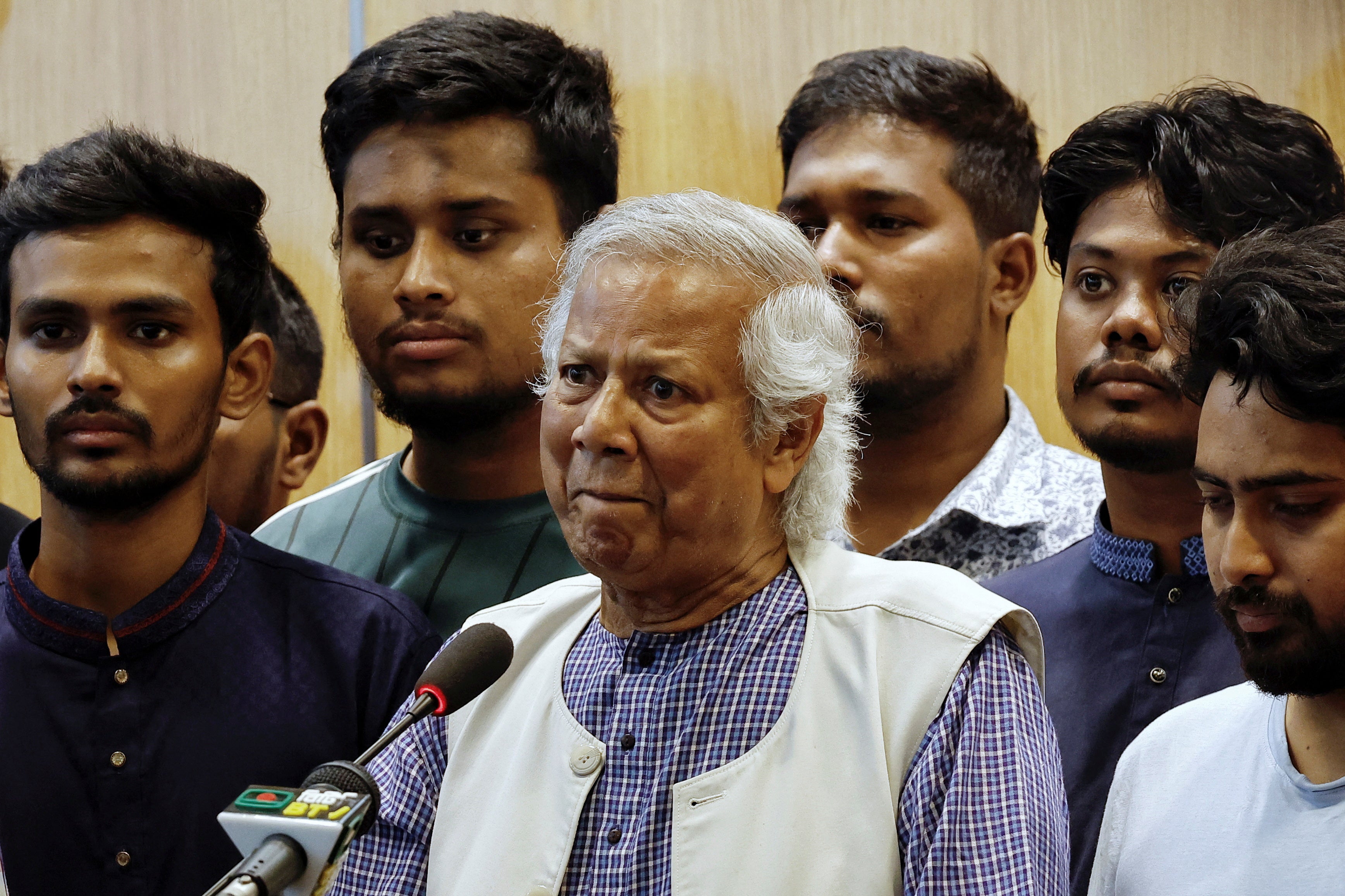Nobel laureate Muhammad Yunus lands in Bangladesh to lead interim government
New leader received by military chiefs and student leaders of protests that ousted Sheikh Hasina
Your support helps us to tell the story
From reproductive rights to climate change to Big Tech, The Independent is on the ground when the story is developing. Whether it's investigating the financials of Elon Musk's pro-Trump PAC or producing our latest documentary, 'The A Word', which shines a light on the American women fighting for reproductive rights, we know how important it is to parse out the facts from the messaging.
At such a critical moment in US history, we need reporters on the ground. Your donation allows us to keep sending journalists to speak to both sides of the story.
The Independent is trusted by Americans across the entire political spectrum. And unlike many other quality news outlets, we choose not to lock Americans out of our reporting and analysis with paywalls. We believe quality journalism should be available to everyone, paid for by those who can afford it.
Your support makes all the difference.Nobel laureate Muhammad Yunus appeared emotional as he arrived in Bangladesh to lead the interim government, days after mass protests against a jobs quota forced prime minister Sheikh Hasina to flee, plunging the country into a political crisis.
His arrival marks a fresh beginning for the South Asian country which has been riven by violence since unprecedented street protests broke up in late June.
He is expected to be sworn in as the head of a team of advisers at the residence of president Mohammed Shahabuddin this afternoon.
Mr Yunus, 84, an economist credited with pioneering microlending, arrived in the capital Dhaka from an overseas trip on Thursday and was received by a jubilant crowd of supporters amid tight security.
He was met at the airport by army chief General Waker-Uz-Zaman and heads of the navy and the air force.
Some of the student leaders who spearheaded the protests against Ms Hasina were also present. They had insisted they would only accept Mr Yunus as the interim leader until fresh elections were held.
Addressing supporters after arriving, Mr Yunus said “a lot of work needs to be done” in Bangladesh and his priority would be to restore order.

“Bangladesh is a family. We have to unite it,” Mr Yunus, flanked by the student leaders, said. “It has immense possibility.”
“Whatever path our students show us, we will move ahead with that,” he said at the airport.
“We had ended those possibilities, now again we have to rise up. To the government officials here and defence chiefs - we are a family, we should move ahead together.”
He urged people to end the cycle of violence but promised not to resort to any repressive measures against anyone.

At least 440 people have been killed during the protests that started as a demand to rollback a jobs quota for relatives of the 1971 war of independence veterans, but spiralled into a movement against the rule of Ms Hasina, who had won a fourth straight term as prime minister earlier this year in an election boycotted by opposition parties.
Mr Yunus, who won the Nobel Peace Prize in 2006, has spent most of the recent years defending himself in more than 100 cases filed by the Hasina administration. His supporters denounced the cases as “politically motivated vendetta” meant to undermine him as a potential rival.
Mr Yunus is credited with helping lift millions out of poverty by providing small loans of less than £80 to rural Bangladeshis through his Grameen Bank, founded in 1983. His success led to similar microfinancing efforts in other countries.
Ms Hasina, however, called him a “bloodsucker” for allegedly using force to get the rural poor, mainly women, to repay the loans. Mr Yunus denied such allegations.

A Dhaka court on Wednesday acquitted Mr Yunus in a labour law violation case in which he had been convicted in January this year and sentenced to six months in jail. He was out on bail.
Mr Yunus faces a Herculean task restoring normalcy in the country and fixing its economy. Dhaka is seeking financial help from countries like India and China as well as lenders like the International Monetary Fund to tide over a decline in its foreign reserves, which fell to $20.5bn in July from $21.8bn the previous month as curfews, shutdowns and internet restrictions took a heavy toll.
The country is also grappling with growing unemployment as nearly 32 million young people are out of work or education. The lack of employment opportunities is reported to have been one of the key drivers of the unrest.

Join our commenting forum
Join thought-provoking conversations, follow other Independent readers and see their replies
Comments